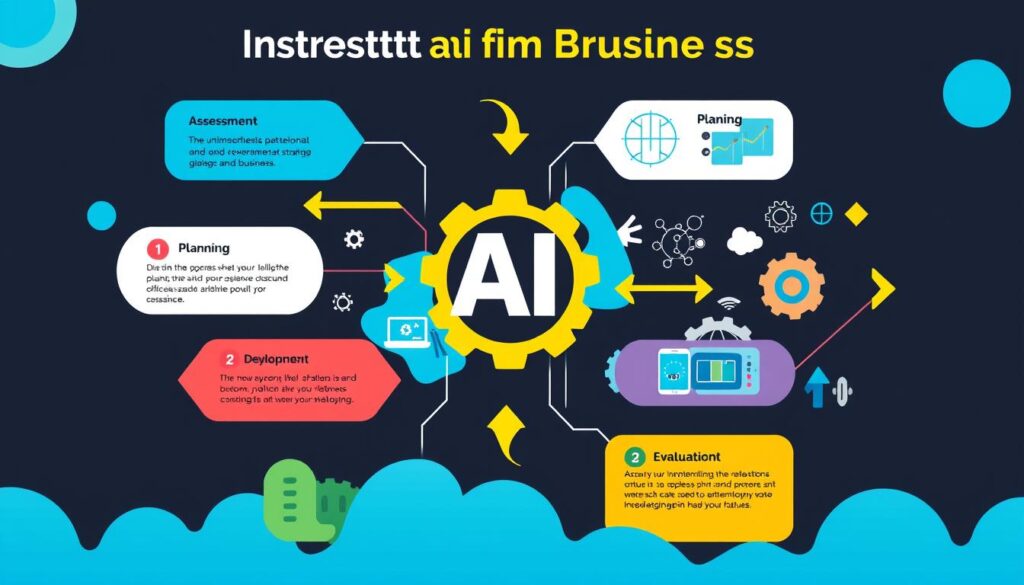AI in business in today’s fast-changing business world, artificial intelligence (AI) is a game-changer. It helps companies change how they work, get better at what they do, and come up with new ideas. More and more businesses see AI as a way to make things smoother, make smarter choices, and find new ways to grow.
This article will guide you through the world of AI in business. We’ll look at the steps to use AI in your company. From planning to putting AI solutions into action, we’ll cover what’s important, the good things it can do, and the hurdles you might face. This will help your business succeed in the digital age.
Key Takeaways
- Understand the transformative potential of AI in business operations and strategy
- Explore the key benefits of AI implementation, including increased efficiency and data-driven decision-making
- Identify common challenges and solutions in building a strong AI foundation within your organization
- Discover strategic steps to effectively implement AI solutions and drive business transformation
- Gain insights into the future of AI and its evolving role in shaping the business landscape
Understanding AI for Business Transformation
In today’s fast-paced business world, AI is a game-changer. It brings many benefits, like better data analytics and smarter decision-making. It also boosts automation and scalability. Companies that use AI can stay ahead of the competition.
Key Benefits of AI Implementation
- Improved decision-making through data-driven insights
- Increased operational efficiency and productivity through task automation
- Enhanced customer experience and personalization
- Reduced costs and improved scalability through intelligent automation
- Accelerated innovation and new product development
Common Challenges and Solutions
AI offers great potential, but businesses face challenges. These include poor data quality, finding the right talent, and integrating AI with current systems. But, with the right approach, these hurdles can be cleared:
- Ensure data quality and governance to support reliable machine learning models
- Invest in building an AI-ready workforce through upskilling and talent acquisition
- Develop a robust integration plan to seamlessly incorporate AI into business operations
Building a Strong AI Foundation
Creating a solid AI foundation is key. This means setting clear goals, getting executive support, and crafting a detailed AI strategy. With this groundwork, businesses can fully harness AI’s power and drive change.
“AI is not just the future, it’s the present. Businesses that embrace this technology will thrive in the years to come.”
AI for Business: Strategic Implementation Steps
Using AI in business needs a smart plan that matches tech with your goals. Start by making a detailed AI strategy. This plan shows how AI can add value and help achieve your long-term goals. You also need to check if your data infrastructure can handle the data for your AI projects.
After setting up the basics, find the best AI use cases for your business. These could be automating tasks, improving customer service, or making operations better. Choosing the right AI projects helps you get the most from your investment.
AI success also depends on people. Employee training and managing change are key. Your team needs to understand and use AI well. A culture that supports AI learning and teamwork helps everyone adapt and use AI to its fullest.
When starting your AI journey, think about the ethics of AI too. Create a strong AI ethics framework to handle issues like data privacy and bias. This way, you build trust and keep your AI efforts in line with your values.
By taking a careful, all-around approach to AI, businesses can harness its power. This leads to lasting growth and innovation.

“Integrating AI into your business strategy requires a thoughtful, step-by-step approach that considers both the technological and human aspects of the transformation.”
Conclusion
AI is changing businesses, making them more efficient and innovative. It helps companies work better, understand their data, and make smarter choices. This leads to a more competitive future.
To fully benefit from AI, businesses need a solid plan. They must invest in the right people, data systems, and ethical AI practices. This way, they can stay ahead in the digital world and stand out from the competition.
The future of business is closely tied to AI’s growth. As AI spreads, it will change how we work and interact with customers. Businesses that embrace AI will be key players in the fast-paced, data-rich world of tomorrow.



